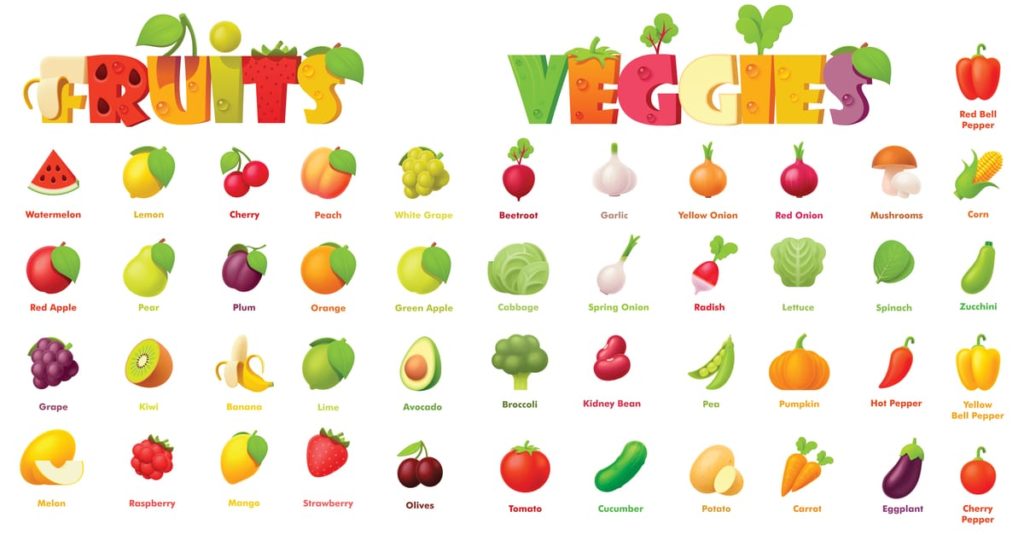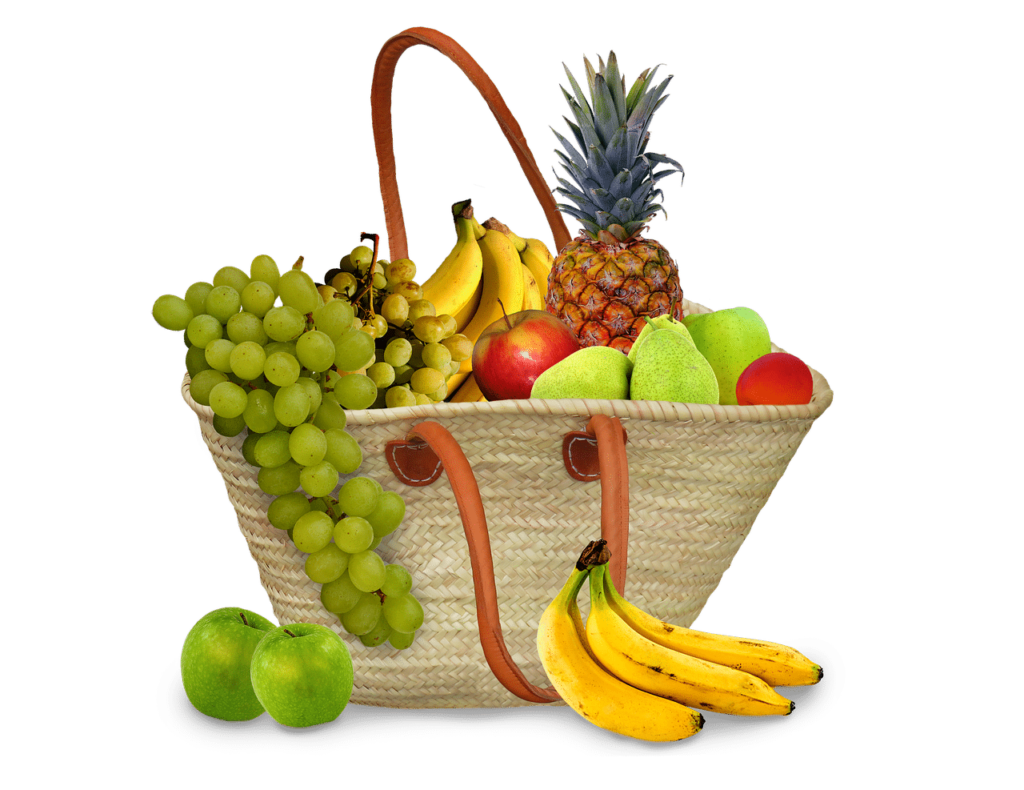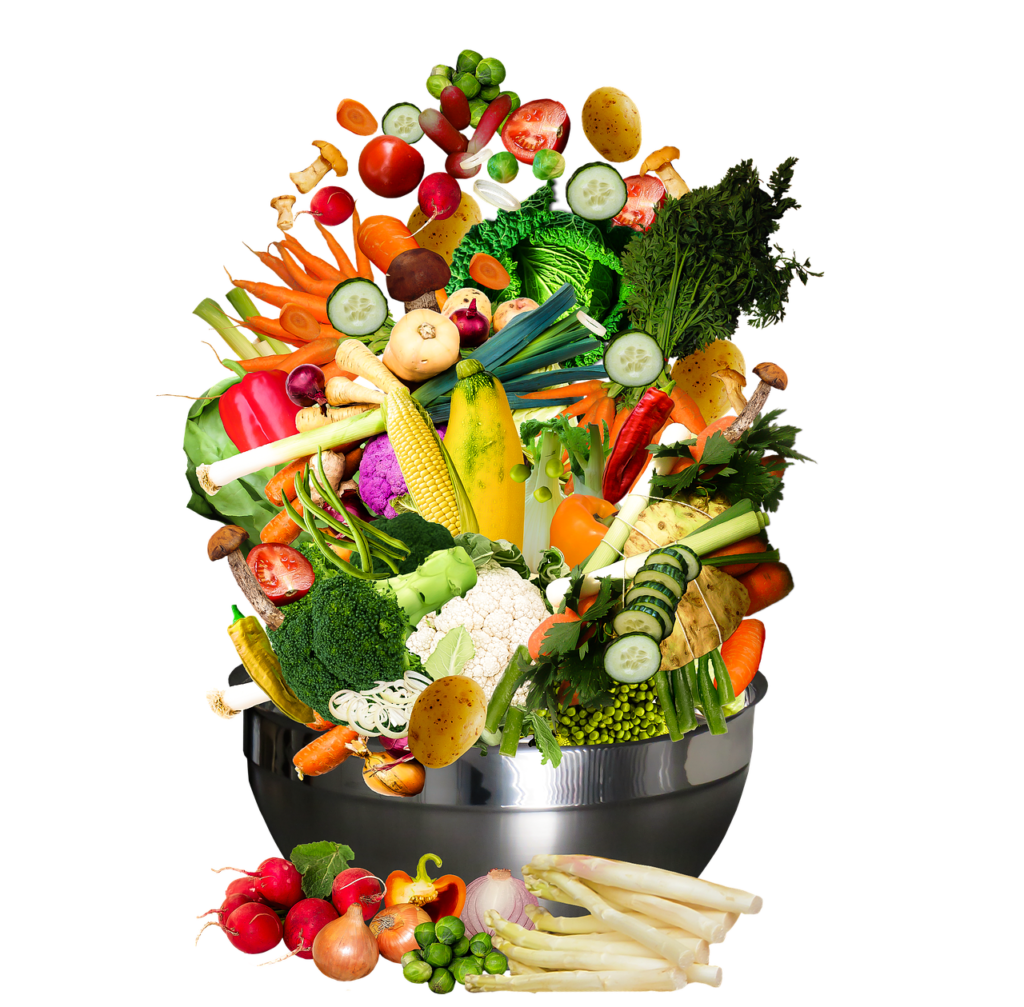Benefits of fruits and vegetables
They are various benefits of fruits and vegetables. Fruits and vegetables a promoted worldwide by different health agencies as health. It is often recommended as part of a healthy eating plan and balanced diet. They are a great source of vitamins and minerals and provide the body with phytochemicals which serve as antioxidants, anti-inflammatory agents and phytoestrogens.
They vary greatly in energy and nutrient and supply dietary fiber. Taking a good amount of fiber has been linked to having lower incidence of cardiovascular disease and obesity.
List of fruits and vegetables
In this picture are the list of fruits and vegetables and their images.

List of fruits

Examples of fruits include
- Apple
- Banana
- Grapes
- Pineapple
- Mango
- Avocado
- Oranges
- Pear
List of vegetables

Examples of vegetables include
- Onions
- Cabbage
- Cauliflower
- Broccoli
- Cucumber
- Mushrooms
- Spinach
- Kale
- Carrots
Lists of purple fruits and vegetables
- Acai berries
- Egg plant
- Purple carrots
- Passion fruit
- Purple asparagus
- Blackberries
- Elderberries
- Raspberries
- Blueberries
- Purple cauliflower
- Beetroot
- Purple cabbage
- Redbor kale
- Purple star apple
- Raddichio
- Grapes
- Plums
- Figs
Storage for fruits and vegetables
You can store foods by
- Freezing
- Drying
- Canning
- curing
- salting
How to wash/clean fruits and vegetables
- Wash and scrub under running water.
- Soap and detergents are not recommended for washing fruits and vegetables.
- Cut out damaged, bruised and rotten parts.
- Wipe and drug fruits and vegetables with clean paper towels.
-
How many fruits and vegetables a day should you have a day?
Everyone including children should have 5 portions of different fruits and vegetables a day.
-
Which fruits and vegetables contain vitamin C?
Berries such as strawberry, raspberry etc.
All citrus fruits such as oranges lemons, limes etc.
Tomatoes.
Kiwifruit.
Sprouts.
Blackcurrants
Broccoli. -
Which fruits and vegetables contain vitamin D?
Spinach
Kale
Mushrooms
Okra -
Which fruits and vegetables are rich in iron?
Dark green leafy vegetables e.g.
Spinach
Cabbage
Swiss chard
Broccoli
Kale
Collard
Beet greens -
What fruits and vegetables are high in potassium?
Potato
Artichokes
Tomatoes
Bananas
Broccoli
Brussels sprouts
Beets
Beet greens
Avocados
Dates
Oranges
Pumpkin
Spinach
Nectarines
Swiss chard
Prunes
Watermelon
Cantaloupe -
What is the difference between fruits and vegetables?
The difference between fruits and vegetable could be either from the botanical or culinary point of view.
From the botanists’ point of view, fruits and vegetables differ according to the part of the plant it develops from. Fruits are something that develops from the ovary of a flowering or as something from the part of a plant that contains the seeds while any other part of the plant is thought to be vegetables. So, things like the roots, stems and leaves of the plant are all considered vegetables.
From the culinary point of view, fruits and vegetables differ according to their taste. Fruits are sweet while vegetables are savoury in taste hence while fruits are used in desserts, vegetables are either eaten as part of a meal or as a main meal.
-
What fruits and vegetables are high in fiber?
Apples
Bananas
Oranges
Raspberries
Strawberries
Mango
persimmon
guavaVegetables that are dark coloured e.g. Generally speaking, the darker the colour of the vegetable, the higher the fiber content
Artichokes,
Carrots,
Swiss chard
Collard greens
Carrots
Beets
Broccoli -
What fruits and vegetables are low in carbs?
Low carb fruits include:
Cantaloupe
Berries
Honeydew
Watermelon
AvocadoLow carb vegetables include:
Cucumbers
Iceberg lettuce
Celery
White mushrooms
Bell peppers.
Spinach
Cabbage
Swiss chard
Broccoli -
What fruits and vegetables are high in protein?
Fruits high in protein
Avocados
Guavas
ApricotsVegetables high in protein
Seitan
Soybeans
Lentils.
Nutritional Yeast
Beans (most types)
Spelt and Teff
Green Peas
Chickpeas -
Which fruits and vegetables have vitamin b12?
Fruits and vegetables are not usually a good source of vitamin b12 but you can read about foods with vitamin b12.
About the author
Nwasom is a pharmacy graduate and a pharmacist currently practising in the United Kingdom. I have great experience communicating with patients and their family as gained through working as a pharmacist in both the hospital and community pharmacy sector. I love writing so it was a natural thing to try and pass medical and health information on through writing.





